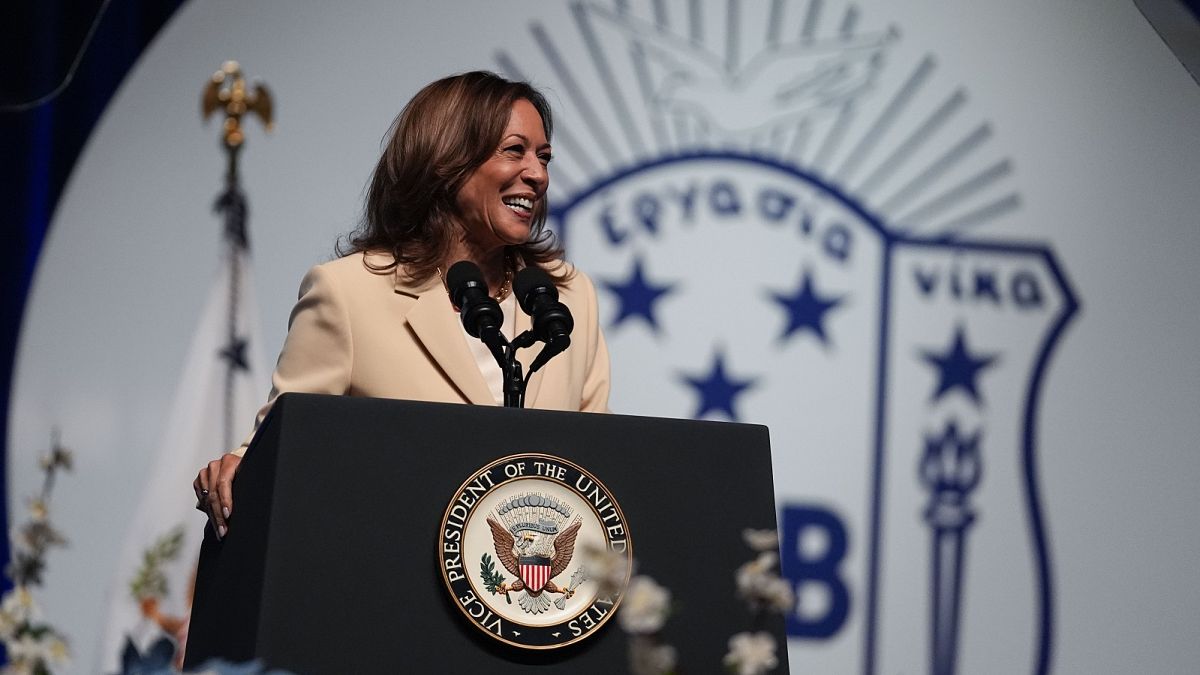What would a Kamala Harris presidency mean for tech?

Tech titans have rallied to support Donald Trump, but Kamala Harris is also a long-time friend of tech. Where would she stand as president?
Tech titans welcomed US presidential hopeful Donald Trump’s pick for vice-president, Senator JD Vance, a former venture capitalist (VC) with investments in tech and crypto companies.
One investor exclaimed “we have a former tech VC in the White House,” while Tesla boss Elon Musk has been vehement in his support for Trump on his social media platform X, reportedly pledging $45 million (€41 million) a month to the Republican committee called America PAC.
But Kamala Harris, the Democratic party’s presumptive nominee to take over from President Joe Biden, who dropped out of the election race, is also a long-term tech ally.
In 2004, she was elected as San Francisco’s district attorney (DA) and served for a second term until 2010, becoming the first woman to be elected to the role and the first Black and South Asian American woman to hold the office.
When Harris campaigned in 2020 to lead the Democrats, her donors included Microsoft president Brad Smith, Salesforce co-founder and CEO Marc Benioff, and Amazon general counsel David Zapolsky.
After Biden endorsed her to lead this year’s presidential bid for the Democrats, she was quickly endorsed by LinkedIn’s co-founder Reid Hoffman, who told Wired that tech donors had withheld their support due to the “turmoil” of Biden’s run for office this year.
Harris raised over $50 million (€46 million) in less than 24 hours after Biden’s announcement.
But what would a future Harris administration mean for tech?
Harris, the AI czar
Biden named Harris the artificial intelligence (AI) czar after tasking her with strengthening the rules around AI as part of his executive order on the tech.
During that time she met with the founders and CEOs of OpenAI, Microsoft, Alphabet and Anthropic.
She has voiced her favour towards safety over company profit.
“In the absence of regulation and strong government oversight, some technology companies choose to prioritise profit over the well-being of their customers, the safety of our communities and the stability of our democracies,” Harris said at the Global Summit on AI Safety in London last year.
Experts say it is likely that she will not make many changes to Biden’s tech and AI regulation plans.
“You would expect a close alignment with the current approach under Biden with potentially some tweaks,” tech analyst Paolo Pescatore told Euronews Next.
“While, regulation is not a sexy topic, technology has and continues to be under the spotlight with the ongoing geopolitical tensions not helping either,” he said, adding that tech leaders and companies are seeking to exert their influence in the election, given the increasing scrutiny they are facing.
Harris has also gone after tech companies when she was senator, most notably their role in online sexual harassment, by questioning executives like Meta CEO Mark Zuckerberg on Capitol Hill, and also during Meta’s Cambridge Analytics scandal.
Harris could be firm but friendly with tech leaders, given her past experiences and actions.
Political polarisation
Meanwhile, Trump has tried to court tech leaders and the cryptocurrency industry by promising donors at fundraisers to enact policies that work in their favour, such as cutting corporate taxes.
Musk, venture capitalists, and crypto investors the Winklevoss twins have flocked to support his presidential run.
But this is not a wave of tech support, according to Carlo Tortora Brayda, founder of the San Francisco-based AI and cybersecurity not-for-profit organisation, the Tortora Brayda Institute.
“I do not see a sway, rather, I see this political polarisation as a cultural thing that runs through the generations; you could call it tribal. People support the politics of their tribe, rather than focusing on the policies of candidates and making a decision that way,” he told Euronews Next.
“What is changing is the composition of leadership and maybe there are more leaders rising to corporate power that have a cultural background that has an affinity with the Trump-Vance hard-line stance,” he added.
Nevertheless, he said that Harris “is a great candidate as she could build on Biden’s work” and is in a strong position as she is from Silicon Valley, favours STEM education and has been a notorious advocate of tech innovation while maintaining a theme of ethical standards and diversity, equity and inclusion in the industry.
He said Trump would likely be seen positively by business leaders who favour tax cuts and deregulation but that a Trump presidency “could unpredictably disrupt the uncomfortable geopolitical equilibrium”.
“Either candidate would have the tech industry’s best interest at heart, and they would approach it in their own very distinctive ways,” Tortora Brayda said.
Related
EU denies picking on US tech giants, says US also…
BRUSSELS (Reuters) - Europe's new tech rule aims to keep digital markets
H-1B Visa 2025: How and why US policy shift may…
Recent changes in US H-1B visa policies have sparked significant concern within the Indian IT professional community hoping to work in America. However, the a
Alibaba Group (BABA) Stock: Chinese Tech Giants Gain $439 Billion…
Chinese tech stocks have gained over 40% this year, adding $439 billion in valueChina’s “7 titans” are outperforming the US “Magnificent Seven” tech s
The Global Spread of Protectionist Policies That Squeeze American Tech…
An increasing number of countries in recent years have begun targeting America’s leading technology firms with policies touted as measures to promote fair com













